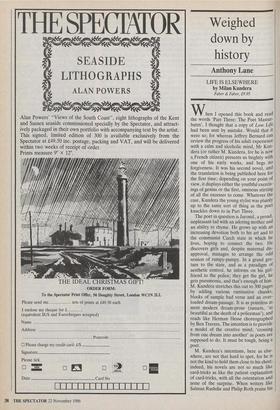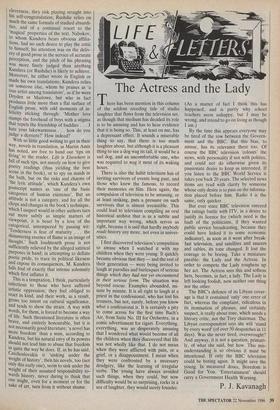Weighed down by history
Anthony Lane
LIFE IS ELSEWHERE by Milan Kundera Faber & Faber, £9.95 When I opened this book and read the words 'Part Three: The Poet Mastur- bates', I thought that a copy of Low Life had been sent by mistake. Would that it were so; for whereas Jeffrey Bernard can review the progress of his adult experience with a calm and alcoholic mind, Mr Kun- dera (or rather M. Kundera, for he is now a, French citizen) presents us brightly with one of his early works, and begs no forgiveness. It was his second novel, and the translation is being published here for the first time; depending on your point of view, it displays either the youthful exercis- ings of genius or the first, ominous stirring of all the excesses to come. Whatever the case, Kundera the young stylist was plainly up to the same sort of thing as the poet knuckles down to in Part Three.
The poet in question is Jaromil, a proud, unpleasant lad with an adoring mother and an ability to rhyme. He grows up with an increasing devotion both to his art and to the communist Czech state in which he lives, hoping to connect the two. He discovers girls and, despite maternal dis- approval, manages to arrange the odd session of rumpy-pumpy. In a grand ges- ture to the state, and as a paradigm of aesthetic control, he informs on his girl- friend to the police; they get the girl he gets pneumonia, and that's enough of him. M. Kundera stretches this out to 300 pages by adding various ruminative chunks, blocks of sample bad verse and an over- loaded dream-passage. It is as pointless as most modern dream-prose (sunsets, `as beautiful as the death of a policeman'), and reads like Herman Hesse choreographed by Ben Travers. The intention is to provide a model of the creative mind, 'crossing from one dream into another' as poets are supposed to do. It must be tough, being a poet.
M. Kundera's intentions, here as else- where, are not that hard to spot, for he is not the kind to hold them close to his chest; indeed, his novels are not so much like card-tricks as like the patient explanation of card-tricks, with all the ostentation and none of the surprise. When writers like Salman Rushdie and Philip Roth praise his cleverness, they risk playing straight into his self-congratulation; Rushdie relies on much the same formula of studied absurdi- ties, and of a continual resort to the `magical' properties of the text. Nabokov, to whom Kundera bears obvious affilia- tions, had no such desire to play the critic to himself; his attention was on the deliv- ery of good prose in the service of accurate perception, and the pitch of his phrasing was more finely judged than anything Kundera (or Rushdie) is likely to achieve. Moreover, he either wrote in English or made his own translations; Kundera relies on someone else, whom he praises as 'a true artist among translators', as if he were Dryden or Marlowe, but who in fact produces little more than a flat surface of English prose, with odd moments of in- felicity sticking through: 'Mother love stamps the forehead of boys with a stigma that repels the friendship of buddies . . . hate your lukewarmness . . . how do you judge a derriere?' How indeed?
With so little good writing to get in their way, novels in translation, as Martin Amis has noted, are free to hand out 'tips on living' to the reader. Life is Elsewhere is full of such tips, not merely on how to give poetry readings (thus yielding the best scene in the book), or to spy on maids in the bath, but on the risks and charms of `the lyric attitude', which Kundera's own postscript names as 'one of the basic categories of human existence'. But an attitude is not a category, and for all the chops and changes in the book's technique, which I suspect would in other authors turn out more subtly as simple matters of viewpoint, it is beset by a love of the categorical, untempered by passing wit: Tenderness is fear of maturity . . . the shimmering essence of flame is an image of thought.' Such loudmouth prose is not sufficiently relieved by the alleged satirical Purposes in hand; in attempting to deflate poetic pride, to trace its political likeness and expose its consequences, M. Kundera falls foul of exactly that intense solemnity which first inflates it.
This is a temptation, I think, particularly infectious to those who have suffered artistic oppression; they feel obliged to react in kind, and their work, as a result, grows too intent on cultural significance, and tends to show the strain. A way with words, for them, is forced to become a way of life. Such threatened literature is often brave, and entirely honourable, but it is not necessarily good literature; 'a novel has more freedom' than a man, according to Kundera, but his natural envy of its powers should not lead him to abuse that freedom in quite the way he does. If, as he has said, Czechoslovakia is 'sinking under the weight of history', then his novels, too (not only this early one), seem to sink under the weight of their assumed responsibility to- wards history, never daring to think that one might, even for a moment or for the sake of art, turn from it without shame.



























































 Previous page
Previous page